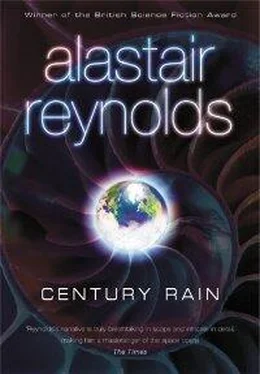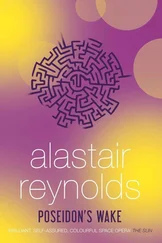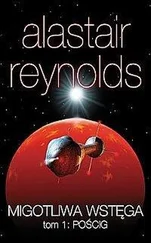The explosion had caused a local alteration in the geometry of the tunnel cladding, sending propagation shocks haring away in all directions; meanwhile, re-radiated energies bounced around in a storm of short-wavelength photons, chewing through the protective armour of Tunguska’s ship and into the soft living tissues of the passengers within.
Sensing further danger, the ship kept its occupants locked within the gee-load cushioning while it strained ahead with every sensor that could claw some scrap of information about the forward state of the tunnel. The reverberations from the missile blast had blinded the acoustics, for now at least. Frantically, the ship switched to backup systems it would never have relied upon during normal flight. Neutrino lasers and wide-spectrum EM pulses peered into the bright, swallowing mouth.
Another two missiles were haring back towards them, groping for a target.
Premature-detonation signals were transmitted at maximum signal strength. Beam weapons, deployed and ready now, locked on and prepared to fire if the missiles did not self-destruct.
One of the pair ripped apart in a controlled explosion, dampeners limiting the blast radius. The other missile shrugged off the kill order and increased its acceleration rate, sprinting for final interception. The ship swerved and contorted itself, pushing its structural limits beyond all conceivable safety margins. Shrill reports of irreparable damage hit Auger’s brain. The ship could still tolerate more damage—but not much more.
The beam weapons swung hard and locked on to the third stray missile. They fired, impacting at a range of only two kilometres up the tunnel from the ship. With its dampening systems not engaged, this missile’s explosion was the most violent of the three.
They raced into the fireball. The ship screamed, writhing in cybernetic agony.
Then it was through.
Faster than language, a thought made its way into Auger’s head.
“We deployed six missiles,” Tunguska told her. “Three have come back. Three more must still be out there.”
At lightning speed, the cloud of machines in her head wove a response. Had Auger answered, or was it Cassandra framing the question? She didn’t know. “How many more close hits can we take?”
“None,” Tunguska said.
Over the next five minutes, two more missiles came back. The first was limping, damaged by glancing encounters with the tunnel lining. The beam weapons engaged and killed it with swift efficiency, destroying it at a range of sixty-five kilometres, the very limit of detection.
The other missile surrendered itself to the kill-order, puffing apart in a damped blast that inflicted only minor damage.
“One’s still out there,” Tunguska said.
“Perhaps this wasn’t such a good idea after all, was it?” Auger observed wryly.
“It was the only one we had,” Tunguska replied phlegmatically.
During the next ten agonising minutes, a sixth missile did arrive, coasting on a high-speed intercept trajectory. It showed no inclination to obey the destruct commands, even when it was very close. Tunguska’s beam weapons gored it open, but the warhead refused to detonate. The missile veered in a hairpin turn, then speared itself at a right angle into the tunnel cladding. Half-blind as they were, the acoustic sensors could still track its progress as it bored through the stressed laminate of artificial space-time. Somewhere deep inside the cladding it finally blew up, and the entire wall bulged outward.
“That was number six,” Auger said. “All six are down. We’re home and dry.”
“No,” Tunguska said. “At least, we can’t be sure. That last one… it wasn’t one of ours.”
“But you sent six—”
“And five returned. That last one was a gift from Niagara. It means he knows we’re here.”
By the time Tunguska’s ship emerged from the portal, automatic damage repair had taken care of the worst of the wounds the ship had sustained in the tunnel. There were some things that could not be put right without specialist attention, but they would have to wait until the vessel returned to Polity space. For now, it was still capable of continuing the chase, albeit at reduced effectiveness, while the bleed-drive was nursed back to full health.
“If only we could be sure of the route Niagara took,” Tunguska said.
Auger leaned forward, resting her elbows on the soft padding of the extruded table. The ship had released its grip on its occupants. They had all been dosed with UR, the tiny machines now swimming through their bodies on a mad errand to correct the genetic damage caused by the radiation from the undamped missile blasts. “I thought you were hoping to catch him between portals.”
“I was,” the Slasher said. “And there was always a chance of that. Unfortunately, Niagara was just a little too fast. He may have cut some safety margins now that he knows we’re chasing him.”
“That missile attack really backfired on us,” Floyd said.
“On the other hand, it may have helped us,” Tunguska said. “Niagara may believe that his return strike destroyed us. With all the acoustic noise, there’s no way he could have bounced an echo off us.”
“So it could go either way,” Auger said. “That’s the top and bottom of it, right?”
“I confess that there are a number of unknowns.”
“It would help if we knew which door he’d taken,” Auger observed.
The hyperweb transition had thrown them thousands of light-years across the galaxy. Auger didn’t need to know the details. There was still at least one transition ahead of them; maybe several. Given the knotted topology of the hyperweb links, they could end up almost anywhere, if they ever succeeded in following Niagara’s trail to the ALS.
“Even if Niagara made his next throat insertion before our emergence,” Tunguska said, “I was still hoping for an unambiguous sign of which portal he used.”
“And?” Auger asked impatiently, tapping a fingernail against the table.
Tunguska had already called up a display of the immediate volume of space around the four neighbouring portals. They were all anchored to anonymous rocks orbiting a compact, dark binary where major planetary formation had never taken place. It was a bleak, hellish place, sizzling with high-energy particles chewed up and spat out again by the twisted Siamese magnetosphere of the binary stars.
“At maximum thrust, with all safety margins disengaged, he could have reached any one of the three outgoing portals a shade before our emergence,” Tunguska said. “He must have been confident that the Molotov device could tolerate that kind of acceleration without its own containment mechanisms failing… but then again, perhaps that was a risk he was prepared to take.”
“Can you see a thrust trail?” Auger said.
“No. Too much ambient radiation around for us to be able to sniff out the ionisation products.”
“What about the portals?” she asked. “Didn’t the staff see which one he used?”
“There are no staff,” Tunguska said. “Apart from routine visits for maintenance, these portals here take care of themselves.”
“Then the machines—”
“All three tell the same story,” Tunguska said, one step ahead of her questions. “They were all activated, geared up for throat insertion and controlled collapse. Niagara sent activation signals to all three—like a man opening all the doors in the corridor in order to mask the one he really stepped through.”
“Clever guy,” Floyd said. “You have to give him that.”
Auger buried her head in her hands. She felt a tremendous, welling frustration with Tunguska. Despite all his technology, all his cool, calm Slasher wisdom, he was still powerless against a single agile adversary. It was unfair, she knew, but she couldn’t help herself. In the presence of a wizard, she wanted miracles, not excuses.
Читать дальше












